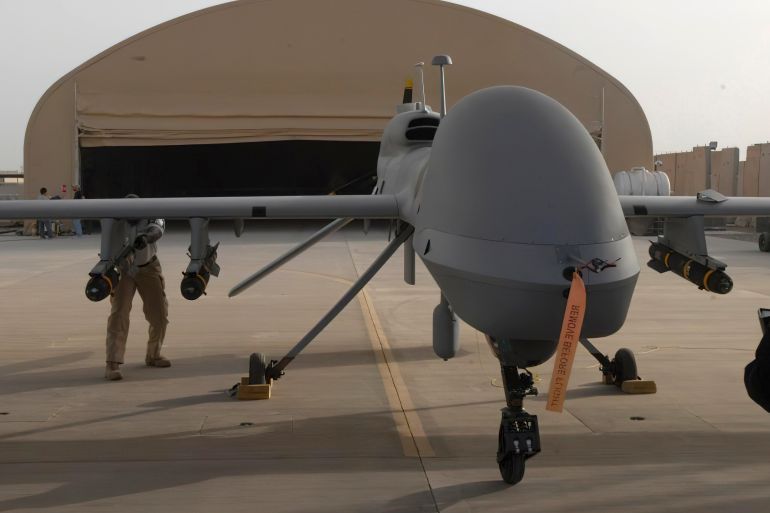Biden urged to rethink Ukraine’s request for Gray Eagle drones
Ukraine has appealed to the US to supply it with powerful drones as it seeks an advantage in its war with Russia.

A bipartisan group of 16 United States senators has asked the Biden administration to carefully reconsider Ukraine’s request for lethal Gray Eagle drones to fight Russia.
The Biden administration has so far rejected requests for the Gray Eagle drone, which has an operational ceiling of 8,800 metres (29,000 ft) and can fly for more than 24 hours, basing it on concerns that the drones could be shot down and may escalate the conflict.
Keep reading
list of 4 itemsUK’s Sunak meets Zelenskyy in Kyiv, offers $60m in defence aid
Ukraine begins evacuating residents from Kherson, Mykolaiv
Russia-Ukraine war: List of key events, day 272
As Russia increasingly turns to so-called kamikaze drones and attacks civilian infrastructure, Ukraine has strongly appealed to the US to supply it with powerful drones that can help them gain an advantage in the conflict.
In their letter, the senators have given Secretary of Defense Lloyd Austin until November 30 to explain why the Pentagon believed the drone was not appropriate for the fight in Ukraine.
Earlier on Tuesday, a Russian-installed governor in Crimea, Mikhail Razvozhaev, announced the shooting down of two drones in the city of Sevastopol, where Russian air defences had been activated.
“Our air defence forces are working right now,” he said on social media. “There is an attack by drones. According to preliminary information, two UAVs [uncrewed aerial vehicles] have already been shot down. All forces and services are on alert.”
Ukraine President Volodymyr Zelenskyy appealed for more help on Tuesday, blaming Russia for using winter temperatures as a “weapon of mass destruction” by attacking Ukraine’s energy infrastructure.
“The Kremlin wants to transform the cold this winter into a weapon of mass destruction,” Ukraine’s president told a meeting of French mayors in a video message.
To get through the Ukrainian winter during the conflict, Zelenskyy urged the Association of French Mayors to send generators, support for de-mining operations and equipment for Ukraine’s emergency services and medics.
Half of Ukraine’s energy infrastructure has been damaged by Russian attacks, Zelenskyy said, leaving millions of people without electricity and water as winter sets in and temperatures drop below freezing.
Rising power consumption during the cold months has led Ukraine’s Prime Minister Denys Shmyhal to announce emergency shutdowns in addition to the planned ones taking place currently across the country.
Sergey Kovalenko, head of the YASNO private energy provider for Kyiv, said that workers are rushing to complete repairs before the winter cold arrives but Ukrainians are likely to live with blackouts at least until the end of March.
The damage to Ukrainian power-generating facilities by Russian missile attacks has been “colossal”, the head of Ukraine’s national power grid operator said.
Volodymyr Kudrytskyi, chief executive officer of Ukrenergo, told a briefing that despite the damages, his company wanted to continue to help provide the conditions necessary for Ukrainians to stay in the country through winter.
The US continued efforts to accelerate assistance to Ukraine and urged other donors to do the same as it announced a payment of $4.5bn in economic aid to start rolling out in the coming weeks.
The funds are aimed at “bolstering economic stability and supporting core government services”, US Treasury Secretary Janet Yellen said.
Ukraine also received a new 2.5 billion-euro ($2.58-bn) tranche of macro-financial assistance (MFA) from the European Union today, bringing the total amount of MFA provided to Ukraine from February 24 to 6.7 billion euros ($6.9bn).
Prime Minister Denys Shmyhal wrote on Twitter that the assistance was “another step of solidarity,” and expressed gratitude to EU leaders.
In a bid to continue its support for Ukraine, Canada on Tuesday said it will impose more sanctions on Belarusian President Alexander Lukashenko’s administration for backing Russia’s war in Ukraine.
Ottawa said it would sanction 22 more Belarusian officials and 16 Belarusian companies involved in military manufacturing, technology, engineering, banking and railway transportation.
It said the officials included some who were “complicit in the stationing and transport of Russian military personnel and equipment involved in the invasion of Ukraine”.